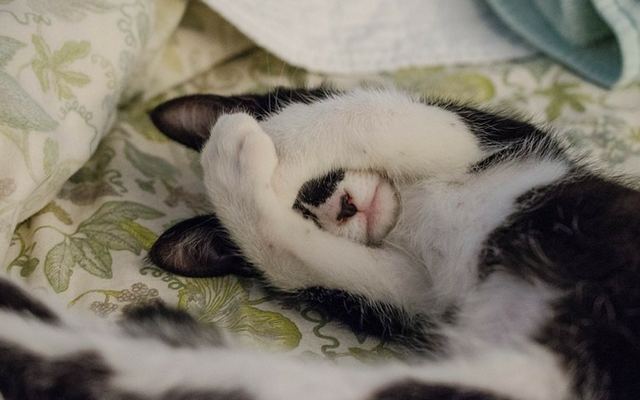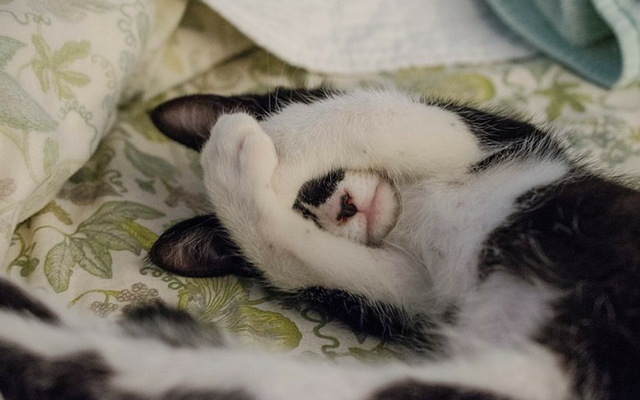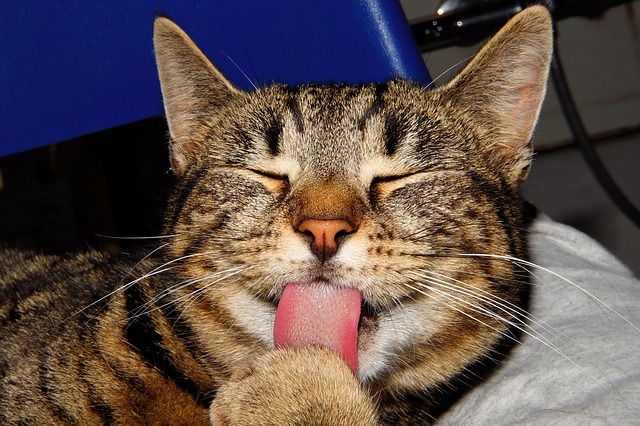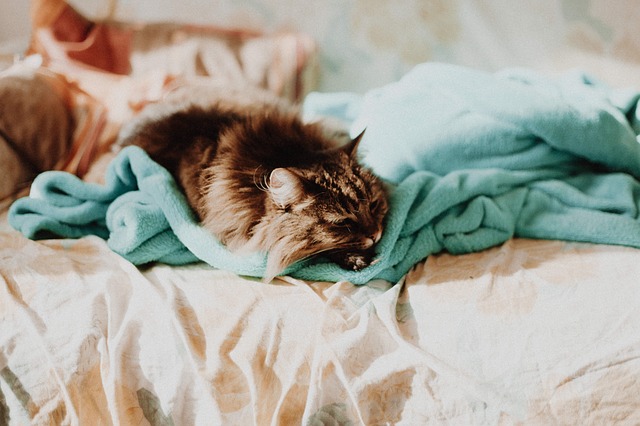
Your bed is supposed to be the place you’re most comfortable, not where you jump up in horror realizing your cat once again wet the sheets.
Inappropriate urination problems are unfortunately common among cat owners. Not only does cat pee in your bed pose obvious sanitation and general “ick” issues, the underlying reason could be something seriously bothering your cat. Before you can make it stop, you first have to figure out why it’s happening.
Here are a few possibilities and what you can do to take back your bed.
Potty Preferences
Some cats that urinate in places they shouldn’t are doing it for the simple reason they need to go, but there’s something about the litter box they don’t like. Humans are particular about where they do their business, and the same goes for cats.
The Box Itself: Size of the box is one of the main reasons cats don’t like the box they’re given. If they feel cramped or have to press their body against the wall to do their business, they’re not going to like it. Some cats are also particular about the box’s shape and design. They might prefer an enclosed box as opposed to a tray or have preferences about how they gain access. Older cats with arthritis might have difficulty stepping into a box with a high edge.
The Fix: Try looking at the litter box from the perspective of a finicky feline. It will likely cost more, but if you really want to stop them from peeing on the bed, splurge for a large box that has what your current box lacks. You can also try changing the type of litter to something clumping and unscented–cats seem to like that best.
The Location: Cats prefer to do their business in peace. They don’t want kids running around making noise, and the sound of the washer or dryer could scare them away. At the same time, they don’t want to have to traverse the entire house when they’re holding their bladder. If the litter box is too far away or in a spot they don’t like, they’ll pick somewhere else more suitable to relieve themselves. For more info, check out The Best And Worst Spots In Your Home For Your Cat’s Litter Box.
The Fix: If you only have one litter box, try getting another and placing it in a new spot. Pick somewhere that’s convenient to get to but also out of the way from the hustle and bustle of the family. If you have a two-story house, you’ll likely need a litter box on each floor for maximum convenience.
The Mess: Cats like to be clean, and stepping into a stinky box of their own urine and feces doesn’t help. If the litter box hasn’t been cleaned recently, they might choose somewhere else that meets their high standards of cleanliness. Your bed with the soft, absorbent blankets is the perfect place.
The Fix: Litter boxes should be cleaned on a daily basis. If you have multiple cats, you might need to grab the scooper more than once a day.
Stress and Anxiety
When it’s not the litter box itself causing the problem, stress and anxiety are often the culprits. While buying a new box is an easy fix, helping a stressed out kitty manage their emotions isn’t as simple.
Sudden Household Changes: A sudden change in the routine could set a cat’s nerves on edge and cause them to act out as a way of communicating their stress. A new baby, another pet, and moving to a different house are all possible reasons a cat is feeling extra anxious. They might start camping out in their owner’s bedroom because that’s where they feel safest. And instead of venturing out into the unknown to use the litter box, they’ll choose their owner’s bed.
The Fix: You can start by keeping the bedroom door closed or draping a shower curtain or another kind of non-absorbent material over the bed during the day. That won’t solve the underlying problem, however. To truly help your cat, you’ll need to find the source of the upheaval. Sometimes it’s obvious, like a new family member, and sometimes it’s more subtle. New carpet in their favorite room, new furniture—anything different could be causing the issue. Once you figure out what it is, start a program using positive training methods to show the cat the new thing is nothing to worry about.
Owner’s Absence: Cats become attached to their family, and when their favorite people are missing, they get stressed out. Longer hours at work or going several days without coming home can cause the cat to stress out. When they pee on the bed, they’re not doing it out of spite. What they’re actually doing is soothing themselves by mixing their scent with their long-lost owner’s.
The Fix: Staying at home with the cat is the best solution, but that isn’t always possible. If that’s the case, improving the cat’s environmental enrichment will help them stay busy and happy when they’re on their own. Make sure the cat has plenty of opportunities to explore and play on their own. Set up puzzle feeders, leave the radio on, and put an interesting cat tree near their favorite window.
Social Conflict: As social animals, cats are happiest and on their best behavior when they get along with everyone in their circle of people. A conflict with a specific person in the family is stressful to them, and they resort to their own feline methods of conflict resolution. In some cases, that means peeing on that person’s bed. They’re not doing it to be mean or spiteful, they’re doing it to mix their scent with the person who’s bothering them.
The Fix: The particular person could be new to the household or not be bonding with the cat like everyone else. Either way, the problem of the cat constantly peeing on their bed can be solved by showing the cat the person is a friend and not someone to be worried about. To change the cat’s opinion, have the person be the one to feed them every day. They should give the cat special treats and participate in playtime to show the cat they’re friend and not foe.
Medical
If none of these situations seem to be the issue, it’s time to take your cat to the vet. Medical problems involving the cat’s bladder or kidneys could be the reason they’re not making it to the litter box in time. Give your vet all the details about what’s happening and discuss with them possible medical conditions.
If you enjoyed this story or article, make sure to share it with your beloved friends and follow Cat's Voice for more heartwarming content & Videos!





